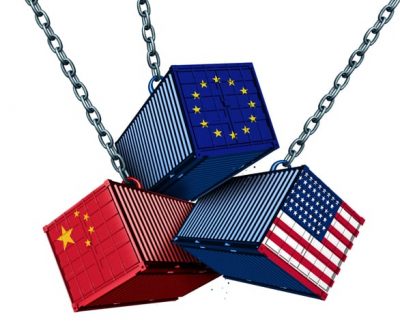U.S. Secretary of State Blinken Wants to Break China-EU Relations

All Global Research articles can be read in 51 languages by activating the “Translate Website” drop down menu on the top banner of our home page (Desktop version).
***
The continual improvement of Chinese-EU relations is irreversible since it embodies the driving force of history, particularly as it relates to the inevitable integration of the Eurasian supercontinent as an outcome of the emerging Multipolar World Order.
China and the EU are economically complementary partners and equally rich civilizations that are unprecedentedly expanding their cooperation through last December’s Comprehensive Agreement on Investment (CAI). This deal enables them to more closely connect their economies and pursue mutually beneficial outcomes through their shared win-win philosophy. Nevertheless, America has attempted to aggressively break their bilateral bonds out of hegemonic jealousy, furious at the scenario of its transatlantic partners evolving from patron states to independent players in International Relations.
This is evidenced by US Secretary of State Blinken’s trip to the bloc last week where he sought to turn its 27 member states against the People’s Republic. The relaunching of their previously frozen dialogue under the former Trump Administration isn’t intended to advance anything other than America’s efforts to divide the EU from China. It was preceded by the Brussels imposing its first sanctions against Beijing in over 30 years as a result of Washington’s pressure upon it to tow the propaganda line on debunked allegations of human rights abuses in Xinjiang.
The People’s Republic swiftly responded in a symmetrical manner that’s fully in line with its rights under international law, thereby dealing a principled tit-for-tat intended to show that no provocations will ever remain unanswered but that Beijing also harbors no intention to escalate matters with Brussels. Both moves are mostly symbolic for the most part but they still worryingly show that Washington is trying to regain its hegemonic influence over the EU. The bloc’s 27 members must therefore be extremely wary of their historic transatlantic partner since it doesn’t have their best interests in mind.
The continual improvement of Chinese-EU relations is irreversible since it embodies the driving force of history, particularly as it relates to the inevitable integration of the Eurasian supercontinent as an outcome of the emerging Multipolar World Order. International Relations are changing from their hitherto zero-sum outlook to the new perspective of win-win engagement, which is led by China’s active efforts to popularize this philosophy across the world. A lot of progress has already been achieved, and although external meddling might lead to a few road bumps along the way, the path ahead is still clear and desired by both parties.
The next step to strengthen Chinese-EU ties in the face of US resistance is to expand their existing cooperation into other strategic spheres such as jointly containing the COVID-19 pandemic, combating climate change, and collaborating on 5G technological solutions for facilitating the Fourth Industrial Revolution. Some EU member states are under heavy American pressure to choose between their their traditional transatlantic partner and their newfound East Asian one in these fields, but such a zero-sum choice is a false one that’s only being forced upon them for hegemonic reasons. In reality, they can and should cooperate with both countries.
Unlike the US, China doesn’t pressure its partners, whether it comes to any aspect of their bilateral ties or especially not in terms of their relations with any third party. All that Beijing asks is that their pragmatic cooperation remain free from any external influences and focused solely on pursuing win-win outcomes. This speaks to how sincerely China treasures the principles of multipolarity as articulated in the UN Charter, which contrasts with the American approach of exploiting strategic elements of its relations with certain states for the purpose of advancing zero-sum outcomes vis-a-vis its perceived rivals such as China.
The world is in the midst of full-spectrum paradigm-changing processes which will unleash an exciting future for all. Everyone stands to benefit as International Relations continue becoming more multipolar, which will open up new opportunities for development that will in turn improve people’s living standards. The EU must resist American pressure to revert back to the discredited model of zero-sum thinking and instead proudly embrace the win-win philosophy that defines the new model of International Relations. That is the only means through which the EU can enhance its strategic independence and truly remain a meaningful player in global affairs.
*
Note to readers: please click the share buttons above or below. Forward this article to your email lists. Crosspost on your blog site, internet forums. etc.
This article was originally published on OneWorld.
Andrew Korybko is an American Moscow-based political analyst specializing in the relationship between the US strategy in Afro-Eurasia, China’s One Belt One Road global vision of New Silk Road connectivity, and Hybrid Warfare. He is a frequent contributor to Global Research.

